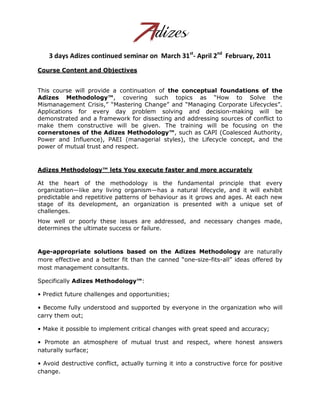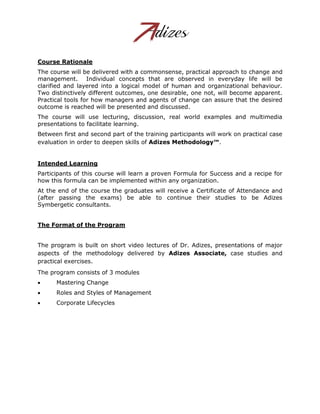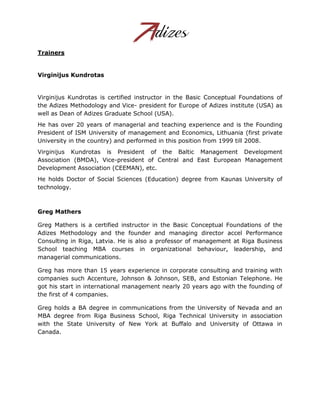Adizes seminar 3 days
- 1. 3 days Adizes continued seminar on March 31st- April 2nd February, 2011 Course Content and Objectives This course will provide a continuation of the conceptual foundations of the Adizes MethodologyŌäó, covering such topics as ŌĆĢHow to Solve the Mismanagement Crisis,ŌĆ¢ ŌĆĢMastering ChangeŌĆ¢ and ŌĆĢManaging Corporate LifecyclesŌĆ¢. Applications for every day problem solving and decision-making will be demonstrated and a framework for dissecting and addressing sources of conflict to make them constructive will be given. The training will be focusing on the cornerstones of the Adizes MethodologyŌäó, such as CAPI (Coalesced Authority, Power and Influence), PAEI (managerial styles), the Lifecycle concept, and the power of mutual trust and respect. Adizes MethodologyŌäó lets You execute faster and more accurately At the heart of the methodology is the fundamental principle that every organizationŌĆölike any living organismŌĆöhas a natural lifecycle, and it will exhibit predictable and repetitive patterns of behaviour as it grows and ages. At each new stage of its development, an organization is presented with a unique set of challenges. How well or poorly these issues are addressed, and necessary changes made, determines the ultimate success or failure. Age-appropriate solutions based on the Adizes Methodology are naturally more effective and a better fit than the canned ŌĆĢone-size-fits-allŌĆ¢ ideas offered by most management consultants. Specifically Adizes MethodologyŌäó: ŌĆó Predict future challenges and opportunities; ŌĆó Become fully understood and supported by everyone in the organization who will carry them out; ŌĆó Make it possible to implement critical changes with great speed and accuracy; ŌĆó Promote an atmosphere of mutual trust and respect, where honest answers naturally surface; ŌĆó Avoid destructive conflict, actually turning it into a constructive force for positive change.
- 2. Course Rationale The course will be delivered with a commonsense, practical approach to change and management. Individual concepts that are observed in everyday life will be clarified and layered into a logical model of human and organizational behaviour. Two distinctively different outcomes, one desirable, one not, will become apparent. Practical tools for how managers and agents of change can assure that the desired outcome is reached will be presented and discussed. The course will use lecturing, discussion, real world examples and multimedia presentations to facilitate learning. Between first and second part of the training participants will work on practical case evaluation in order to deepen skills of Adizes MethodologyŌäó. Intended Learning Participants of this course will learn a proven Formula for Success and a recipe for how this formula can be implemented within any organization. At the end of the course the graduates will receive a Certificate of Attendance and (after passing the exams) be able to continue their studies to be Adizes Symbergetic consultants. The Format of the Program The program is built on short video lectures of Dr. Adizes, presentations of major aspects of the methodology delivered by Adizes Associate, case studies and practical exercises. The program consists of 3 modules ’éĘ Mastering Change ’éĘ Roles and Styles of Management ’éĘ Corporate Lifecycles
- 3. Roles and Styles of Management Module 2 March 31 ŌĆō April 2, 2011 Day 3, March 31st, 2011 Effectiveness & efficiency 10:00 - 11:20 (P)roviding for the clientsŌĆÖ expected needs (A)dministering 11:20 - 11:40 (E)ntrepreneuring 11:40 - 13:00 (I)ntegrating Incompatibility of PAEI roles 13:00 - 14:00 Lunch Producer (Paei) 14:00 - 15:20 The lone ranger (P---) Administrator (pAei) The Bureaucrat (-A--) 15:20 - 15:40 Creative Contributor (paEi) Entrepreneur (PaEi) The Arsonist (--E-) 15:40 - 17:00 Integrator (paeI) The Super Follower (---I) Deadwood (----) Sources of conflict from interests and different perceptions
- 4. Day 4, April1 st, 2011 The Ideal Executive (PAEI) 10:00 - 11:20 Complementary teams Conflict of Styles 11:20 - 11:40 How to deal with ŌĆĢPŌĆØ dominant style. How to deal with ŌĆĢAŌĆØ 11:40 - 13:00 dominant style 13:00 - 14:00 Lunch How to deal with ŌĆĢEŌĆ¢ dominant 14:00 - 15:20 style How to deal with ŌĆĢIŌĆ¢ dominant style How to deal with several different styles simultaneously 15:20 - 15:40 How to improve components of (ŌĆĢPŌĆ¢), (ŌĆĢAŌĆ¢), (ŌĆĢEŌĆ¢) and (ŌĆĢIŌĆ¢) 15:40 - 17:00 styles Prescriptions needed for a good manager as a team member
- 5. Corporate Lifecycles Module 3 April 2, 2011 Day 5, April 2nd , 2011 Lifecycle and the nature of the problems Normal and abnormal problems of different stages: 10:00 - 11:20 Courtship, Infancy Normal and abnormal problems of different stages: Go-Go, Adolescence and FounderŌĆÖs Trap 11:20 - 11:40 Normal and abnormal problems of different stages: Prime, Stability The signs of organizational aging 11:40 - 13:00 Problems of aging companies: Aristocracy, Salem City, Bureaucracy and Death Predicting the lifecycle 13:00 - 14:00 Lunch PAEI and Lifecycle CAPI over the Lifecycle 14:00 - 15:20 The causes of organizational aging Organizational therapy Treating Courtship, Infancy and Go-Go Getting out of the founderŌĆÖs or family trap 15:20 - 15:40 Treating adolescence and remaining in prime How to treat the Aristocratic Organization, Salem City Treating Bureaucracies and Dead Organizations 15:40 - 17:00 The optimal path Strategy, structure, reward system, staffing and managerial style over the lifecycle
- 6. Trainers Virginijus Kundrotas Virginijus Kundrotas is certified instructor in the Basic Conceptual Foundations of the Adizes Methodology and Vice- president for Europe of Adizes institute (USA) as well as Dean of Adizes Graduate School (USA). He has over 20 years of managerial and teaching experience and is the Founding President of ISM University of management and Economics, Lithuania (first private University in the country) and performed in this position from 1999 till 2008. Virginijus Kundrotas is President of the Baltic Management Development Association (BMDA), Vice-president of Central and East European Management Development Association (CEEMAN), etc. He holds Doctor of Social Sciences (Education) degree from Kaunas University of technology. Greg Mathers Greg Mathers is a certified instructor in the Basic Conceptual Foundations of the Adizes Methodology and the founder and managing director accel Performance Consulting in Riga, Latvia. He is also a professor of management at Riga Business School teaching MBA courses in organizational behaviour, leadership, and managerial communications. Greg has more than 15 years experience in corporate consulting and training with companies such Accenture, Johnson & Johnson, SEB, and Estonian Telephone. He got his start in international management nearly 20 years ago with the founding of the first of 4 companies. Greg holds a BA degree in communications from the University of Nevada and an MBA degree from Riga Business School, Riga Technical University in association with the State University of New York at Buffalo and University of Ottawa in Canada.
- 7. Administrative details: The course will be organised by Adizes Graduate School (California, USA) and Adizes Institute (USA) The training will take place at: March 31st ŌĆō April 2nd in Lithuania. Exact place we will provide later. The training will take place at: Tuition fee for 3 days: 1460 LT + PVM Registration To register, candidates must fill contact information, and send it by e-mail to this address: vikkmi@ism.lt For more information about trainings concept please contact: Dr. Virginijus Kundrotas Dean of Adizes Graduate School Vice President of Adizes Institute, Europe Cel: +370-682-43377 Fax: +370-37-205-676 Email: virkun@ism.lt For more information about registration and administration questions please contact: Ms. Viktorija Kmieliauskaite BMDA coordinator Cel: +370 618 15 852 Tel: +370 37 302 206 Fax: +370 37 205 676 Email: vikkmi@ism.lt
- 8. Name and Surname Full Name of Institution Position ( and academic degree, if applicable) Telephone Fax ąĢ-mail Hotel Booking Yes / No Person(Institution),which recommended you to the course







